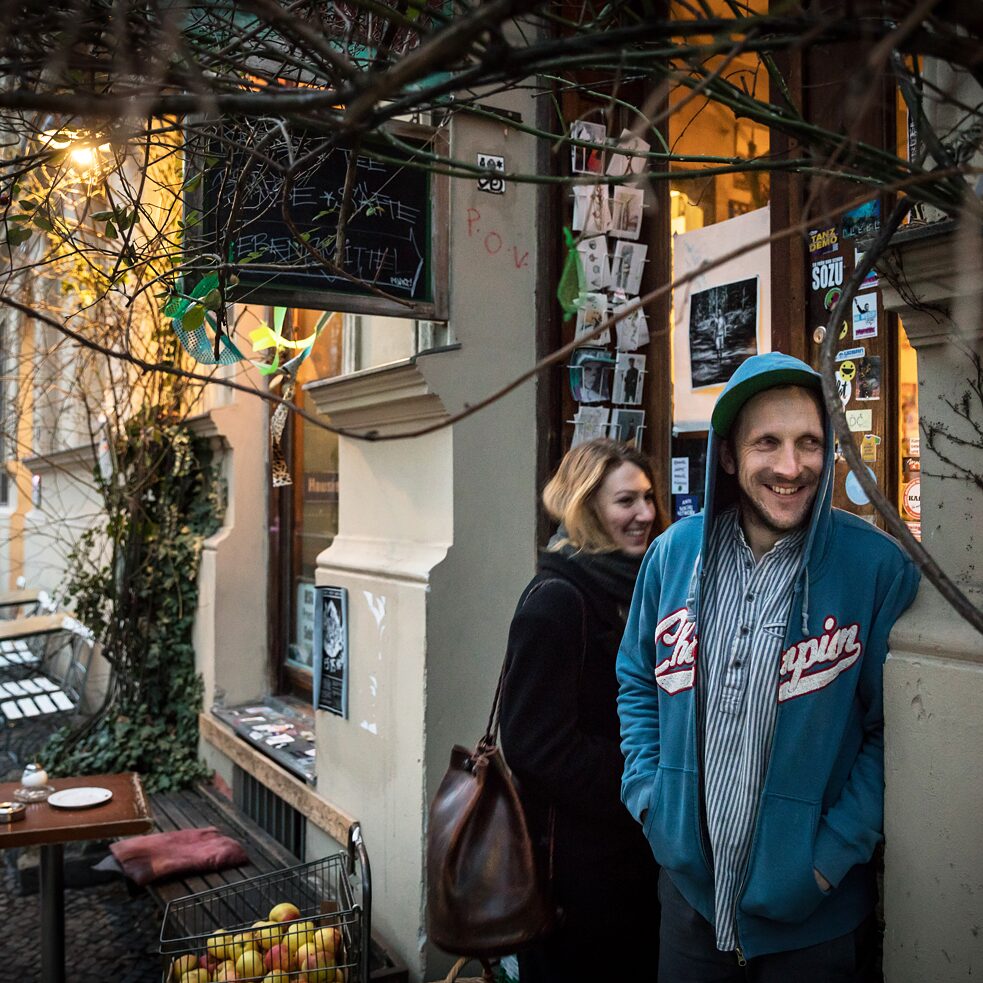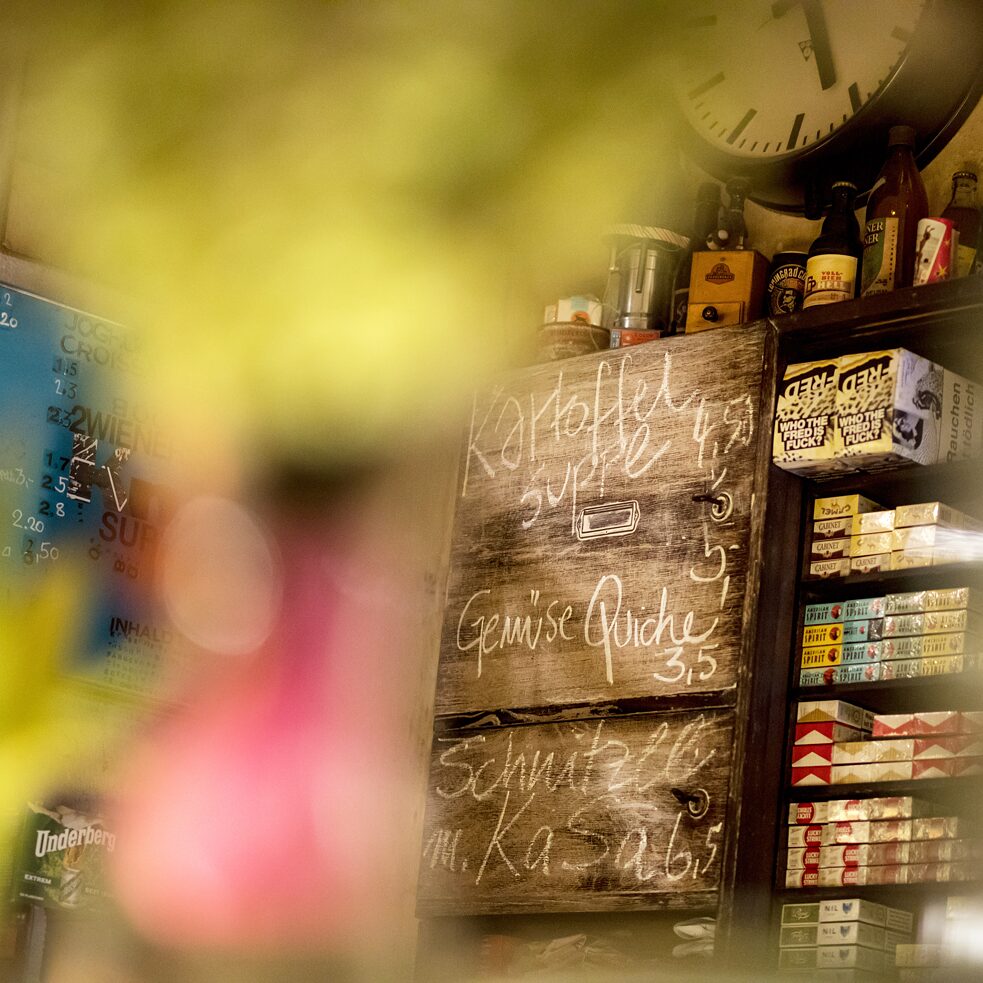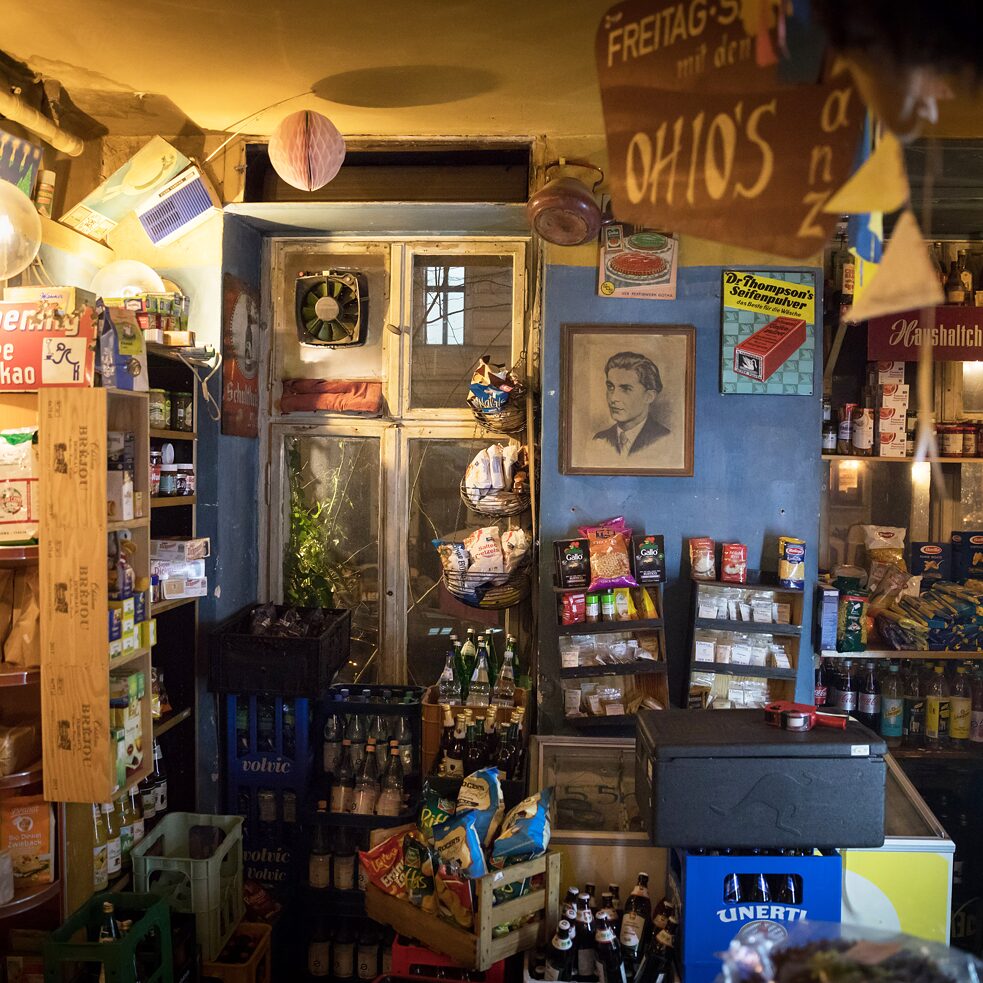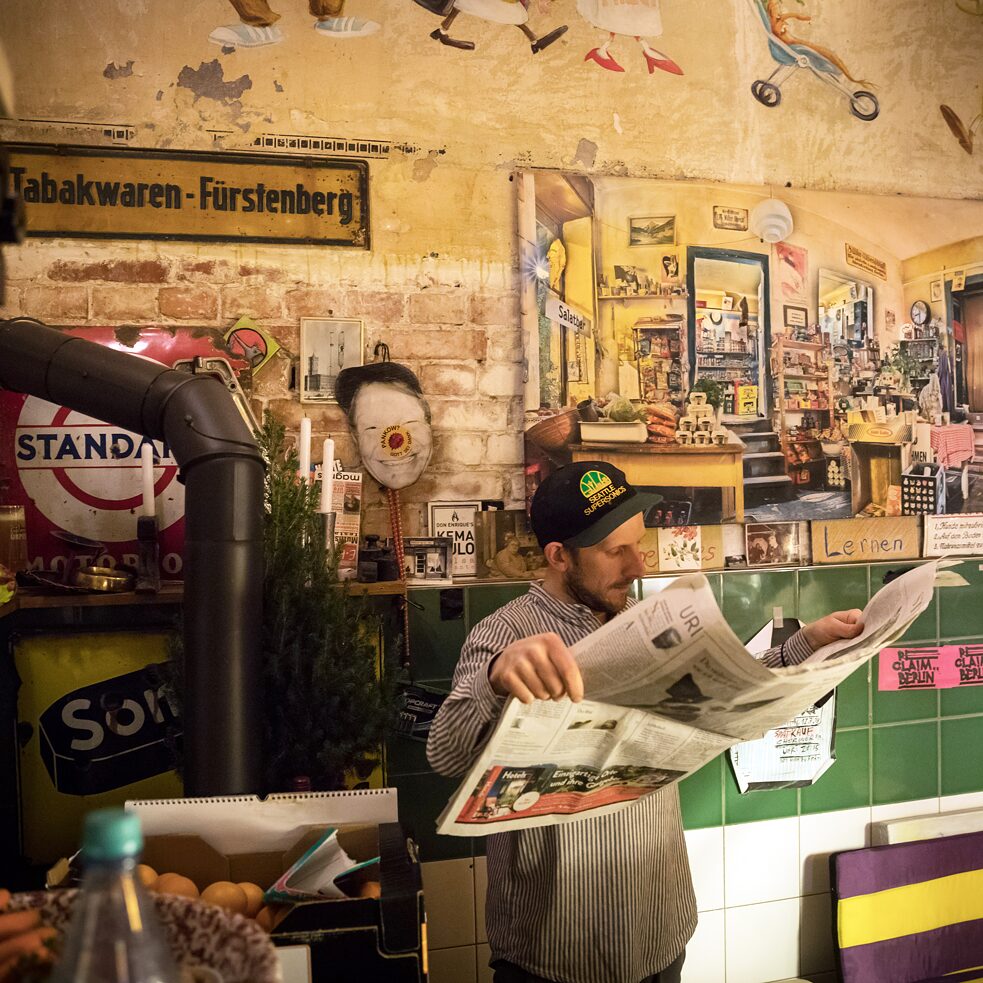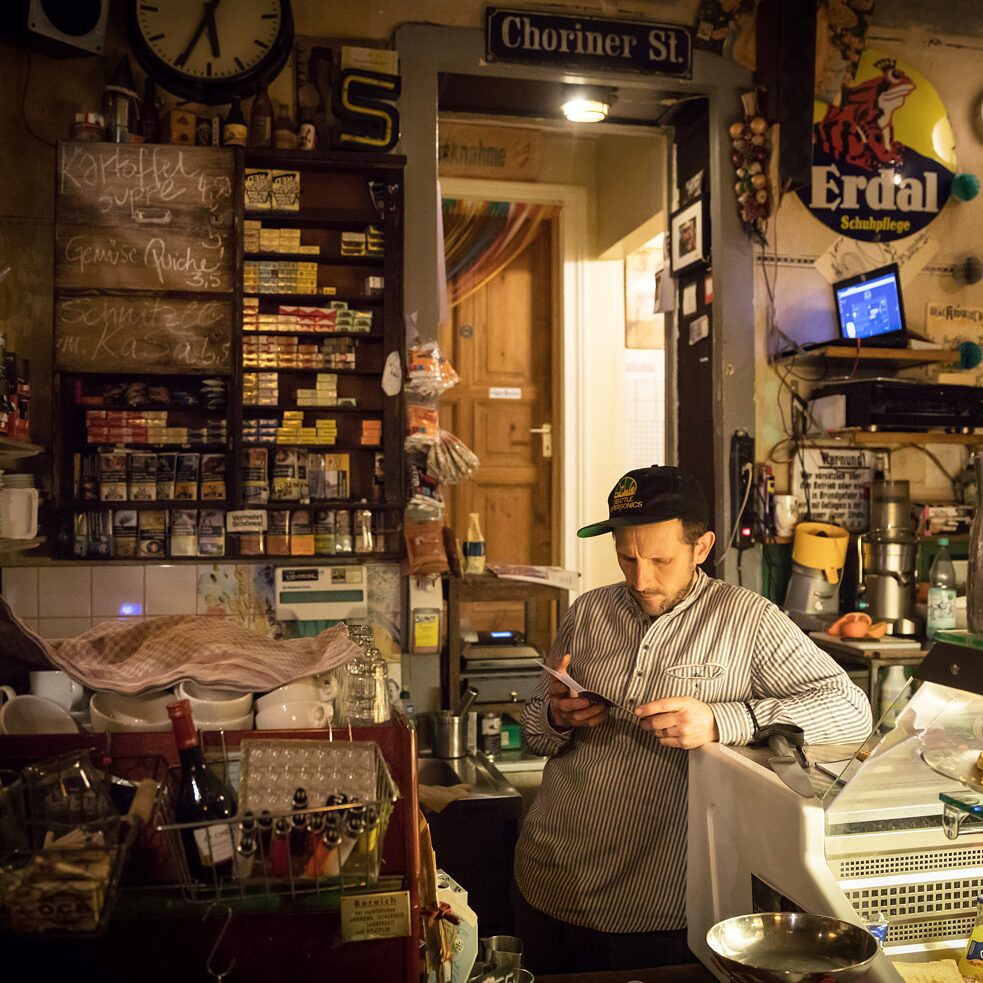Always Open
The Mom-and-Pop Store
In the heart of Berlin, there is a small corner store, lovingly dubbed the “living room of the neighborhood.” Sadly, the shop’s owners are facing eviction after three decades in business. Sally McGrane and Axel Scheele tell the story of the little grocery on Choriner Street.
Listen to this episode: Apple Music | Spotify | Download
This Berlin-based story comes from Sally McGrane and Axel Scheele. This episode tells the story of an independent late-night grocery store, or ‘Späti,’ located in the Berlin neighborhood of Prenzlauer Berg. Sally and Axel speak with neighborhood residents and Thomas “Hotte” Albrecht, the store owner. New York City photographers James and Karla Murray also share their thoughts on the importance of the disappearing mom-and-pop store. This episode features music from the Bolschewistische Kurkappelle Schwarz-Rot, The Devil’s Blind Spot, the Hot Swing Alforno Jazz Band, and Axel Scheele. The photo for this episode is from Gordon Welters and shows Hotte at his Späti. View the rest of Gordon’s photos in the gallery below.
Transcript
[MUSIC]
Romy Sydow: [IN GERMAN] Wir sind die Bolschewistische Kurkapelle Schwarz-Rot. I’m Romy. I play the saxophone, and I’m also singing.
Sascha Grohmann: Hello, I’m Sasha. I’m the drummer. And we make brass music from the eastern part of Berlin, and we play for the social projects and for social problems — like the Choriner Street.
[MUSIC]
Sally McGrane: This is a protest.
Axel Scheele: To save a tiny grocery store in Berlin’s Prenzlauer Berg
Sally McGrane: The song is about solidarity.
Romy Sydow: We all can help ourselves only when we are fighting together.
[MUSIC]
Romy Sydow: We want to give groups with this kind of problems a stage. Sometimes people call us and say, could you help us and play some songs for solidarity? To make it louder than it would be without music.
Axel Scheele: In Germany, we used to have family-run ‘Tante-Emma-Läden,’ or, ‘Auntie Emma stores’ like this one everywhere. Now, they’re hard to find.
Sally McGrane: For THE BIG PONDER, this is Sally McGrane.
Axel Scheele: And this is Axel Scheele. And we found Berlin isn’t the only place where mom-and-pops are struggling.
James Murray: Hello, I’m James Murray.
Karla Murray: I’m Karla Murray. Together, we’re American photographers. We’re based in New York City, and we’ve been documenting mom-and-pop stores in and around New York City — all the five boroughs — for well over 25 years. To us, these mom-and-pop stores — they’re like the backbone of the city. They make like each neighborhood of New York unique. We live in the East Village of Manhattan. The reason we chose to live here — I mean, I grew up in the Bronx, I’m a native New Yorker. The reason we chose to live in the East Village was because of the preponderance of these mom-and-pop stores, music venues, theaters, art galleries. It was just so many things to see and do, and, you know, we fell in love with it.
Sally McGrane: They started taking pictures of storefronts they liked.
James Murray: Yeah, initially the project started out, we were heavily drawn to the aesthetics. The lettering styles of the old signage, the hand-painted signs, the window displays, and our East Village was just chock-full of that.
Karla Murray: We had taken a photo — and I remember exactly what it was — of a little mom-and-pop candy store out in Brooklyn. And we went back a few months later, and the candy store was gone. And we said to ourselves, wow, the neighborhood doesn’t look the same anymore. It doesn’t feel the same anymore. Just the loss of this one store seems to have impacted this whole neighborhood like in a negative way. We said, wow, we really have to start documenting these before they disappear.
Axel Scheele: That’s when they started going in and talking to the owners.
Karla Murray: They just had so much pride in their store, and they were so happy to share like the history and like, you know, funny stories with us.
James Murray: Yeah, that’s what really kicked the whole project off.
Karla Murray: We went into this one Pasticceria that’s in business since 1894. And the fourth-generation owner told us that it was the founder — which is his relative — is actually the one that brought electricity to the whole neighborhood in the East Village. He went to ConEd, and he asked them, well, how do I get power? And they said, oh no, you’re in a poor neighborhood. You don’t need electricity. You’re fine just the way you are, but if you get 40 local business owners to sign a petition that you could benefit from electricity, we’ll think about it. So, in the Italian innovative way — no problem. Sunday night dinner — that’s his big extended family. He got his 40 signatures just at his Sunday night dinner.
Axel Scheele: Over the years, Karla and James watched as mom-and-pops in their neighborhood were replaced by big corporate chains.
Karla Murray: Definitely what we’ve learned from interviewing the storeowners is that if they don’t own the building, they’re already in danger of closing. I remember one place — it was a sheet music store — he told me that they were going to raise the rent 15 times.
Sally McGrane: Some of the shops they photographed closed because the owners retired or died, but most had another problem ...
Karla Murray: It was just the real estate prices started really going higher and higher and higher and higher in New York City, like in the early 2000s. Like by 2003, 2004, that’s when we saw a huge, huge increase in the amount of stores that were closing — almost, I would say, 90-something percent of the time it was because of a rent increase.
James Murray: The neighborhood’s vibrancy just goes to zero because these are ad hoc community centers more than we even understood.
Karla Murray: You know, usually when it’s a mom-and-pop store, they employ local people from the neighborhood, too. So, the money stays in the neighborhood.
James Murray: Most stores where we would go in, there’d be a group of neighborhood characters hanging out. I mean, we went to a pork store. They had an 80-year-old singing deliveryman who sang us Frank Sinatra, while seven or eight guys stood around eating lunch.
[MUSIC]
James Murray: The elderly would be sitting out front, watching traffic, and they were safe and cared for.
Karla Murray: Listening to the radio, you know.
James Murray: Yeah, listening to the ball game — like baseball on the radio — and it was like a whole little community center, a whole little scene. And now when we go into certain neighborhoods that have been heavily redeveloped, the streetscape is empty, and people are more hidden away and just sitting on their computers. Our whole project is to say, yeah no, there’s still a better way of doing this, and it still exists. It’s disappearing rapidly. We like to say it’s disappearing like acres of rainforest where you don’t even realize how many acres. Every day, these stores are closing and closing and closing, and we’re losing this way of life that is just, we feel, far superior than the alternative.
Sally McGrane: They’ve published three books and had shows as far away as Munich.
Karla Murray: We honestly thought that nobody would be interested in them except for the people that knew them. Why would, for instance, somebody in Germany care about a mom-and-pop store in New York? But we were so wrong. The same thing that was happening in New York was happening in their own neighborhood. It touched people’s hearts all over the place.
Axel Scheele: For Karla and James, keeping mom-and-pop stores going can even be a matter of life and death.
James Murray: The candy store in Bed-Stuy, Brooklyn, Katie’s Candy, that was forced to close due to a huge rent increase ...
Karla Murray: Right, her son stayed in touch with us, and he called us on our phone. And he told us, you know, Katie died. And I said, oh, why? You know, the last time we saw her, she looked so well. And he said, well, you know, when the store closed, she had nothing to do all day, you know, like the store was everything to her. Like she spent like 18 hours a day almost there. When she didn’t have the store to go to anymore, she got sick with pneumonia, and then, she just got in the hospital, and she died. Like she didn’t have the will to live. It broke our hearts to hear that because, you know, to this day, that store’s still empty. We wonder, would Katie be alive today if the landlord had just not increased her rent and let her stay?
James Murray: The whole time we were interviewing Katie, people would check in, how are you doing, Katie?
Karla Murray: She kept prices low just to keep drugs away from the neighborhood because there was a lot of crime and drugs and things like that. But she had none of that on her block because she kept the kids from taking drugs. And if they couldn’t afford candy, she’d give them candy. You know: Don’t take drugs, you know. Have a lollipop.
Sally McGrane: Back in Berlin, a few weeks after the protest, we checked in on the grocery. It got its start a few years after the Wall fell on a quiet side street in what used to be East Berlin. You’ll almost always find someone sitting out front under the climbing roses at one of the sidewalk tables.
Axel Scheele: That’s where we meet Philip. He’s lived in the neighborhod, or ‘Kiez,’ for almost 30 years — just like the store. That’s what he had to say about it.
Philip: Very organic and rooted in the Kiez, and it was always from the people of the Kiez, for the people of the Kiez.
Axel Scheele: Lydie moved to Berlin two years ago. She’s here every day.
Lydie: Here in Berlin, you don’t have like in Paris, for example, this tradition of café, bistro. And so, it replaces a little bit, I think, the café. So yeah, I think a lot of people actually come here to meet someone, to have a moment together.
Axel Scheele: Katerina lives just around the corner.
Katerina: It’s a really special place. I like the interior. I like the mood, the atmosphere. People coming here can just sit alone, have a coffee, look at the other people and relax. [IN GERMAN] Es ist nicht so schicki-micki, oder durch-gestyled. How do you say it in English? It’s not so chic. I think that’s really important for the neighborhood because the neighborhood is changing, and I think we need these places like that.
Sally McGrane: When it opened in 1995, strict regulations meant that regular supermarkets had to close at 6:30 pm. Anyone who wanted groceries after that had to come here. To the ‘Spätkauf,’ or ‘Late Shop.’
Axel Scheele: Alex Ross is a British filmmaker. He used to work at the store back then and made a movie about it: Tom Atkins’ Blues.
Alex Ross: Prenzlauer Berg then, it was mixture of all these Germans and squatters and punks, wasters, malingerers, artists, people like me, who’d come from abroad, people from West Berlin. It was just fantastic.
Sally McGrane: But over the years, the laws relaxed. By the end of the aughts, the store had lost so much business it looked like it would close. That’s in the movie, too.
Alex Ross: The supermarket around the corner opened up until midnight. We were doomed.
Sally McGrane: In the movie, the ‘Spätkauf’ says goodbye to its beer-drinkers and unemployed butchers, its sidewalk philosophers, friends, lovers, and families who keep coming back even after they’ve been pushed out of the neighborhood by gentrification. And it closes forever. In real life, Thomas Albrecht, who everybody calls Hotte, started selling coffee. He added vegan sandwiches and organic salads to the menu. For a while, he rented out the small backroom for tourists to sleep in. Today, groceries don’t bring in much money, but he still keeps them stocked. A matter of pride, he says.
Thomas “Hotte” Albrecht: [IN GERMAN] Mein Spätkäufer stolz, ja. We try to offer all the things you might forget in the supermarket and which you will need on the weekends or in the evening hours. Tomatoes, stuff for pasta, different oils, tuna. Beer, of course, some lemonades, eggs, different sort of things for the household, sugar. Vegetables, of course. Apples, cheese, and sausages. Milk, of course. Toilet paper, washing detergent. Hello, my name is Thomas. I have a little Späti in Berlin, Prenzlauer Berg. Some call it a Tante-Emma-Laden, which is the topic of this podcast, actually.
Sally McGrane: Hotte grew up in the neighborhood. He used to play basketball around the corner as a teenager. Afterwards, he and his friends would come here and hang out. It’s where he drank his first beer.
Thomas “Hotte” Albrecht: 25 years ago, it was a very different place, it was a regular workers’ district. Now, you have really rich people around here. It changed a lot, of course. Yeah, all kinds of people coming here. The new neighbors with a lot of money. People who are here for a long time. Young people, old people. For me, it’s a good mix of people.
Sally McGrane: Later, he got a job here. When Hotte was 24, the owner who started the shop decided he wanted to do something different. Hotte took over. That was almost 20 years ago.
Axel Scheele: These days, Hotte and his family live in one of the apartments upstairs. His friends say he’s mentoring a younger generation the way the first owner mentored him.
Florian Seefeldt: Hi, I’m Flo. I work in the Späti. As work always is, it’s a little bit painful because you don’t want to work normally, but I guess I made a good choice because it’s quite ok to work here. Somehow, I earn a little money here to have the rest of the time for making music. That’s my concept.
Sally McGrane: This is his band: the Hot Swing Al Forno Jazz Band.
Florian Seefeldt: Sometimes, we play in front of the store. Two years ago, we made concerts inside, which is really cozy and cool because there’s space for 20 people maximum. And the shop is still open, so people also go in and buy cigarettes while the music is going on. This was actually a nice atmosphere. I grew up just around the corner, and I know this area quite well. It was really the first Späti I knew. So, that’s really where you go on Sunday to buy milk.
Sally McGrane: Paul Nolte studies the history of consumption. In the late 1800s when this neighborhood was built, shops like this one were something new. They replaced the street vendors, traveling artisans, and open-air markets Berliners were used to back then. For the city, moving shopping inside had an upside: it kept the streets orderly.
Paul Nolte: My name is Paul Nolte. I’m a professor of modern contemporary history at the Free University in Berlin. I’m happy to talk to you today about this Spätkauf on Chorinerstrasse.
Sally McGrane: What strikes him right away is the lack of signage out front.
Paul Nolte: You think it’s a café. It is a café also, it seems, but inside it’s a store, but it doesn’t advertise itself. They have their ‘Stammkunden,’ as you say in Germany, the regulars who come here and know what to expect.
Sally McGrane: Inside, Paul sees signs of the store’s 19th- and 20th-century tenants — a butcher, a poultry shop.
Paul Nolte: You see the white and green tiles, that seems to be from the original store. It’s easier to keep everything clean. Well of course, you have a counter. I mean, that’s essential. For many people, I think, supermarkets have become so anonymous, and they really appreciate it if they come to counter and meet a real person. There’s a box that has ‘Neues Deutschland’ on it, the name and logo of the former socialist party newspaper in the GDR, and there’s a small red banner that wishes success in Moscow for the — some Berlin, I don’t know, delegation or group. And that speaks to the history of this particular neighborhood that was part of East Berlin before the fall of the Wall in 1989.
Sally McGrane: In Germany, these mom-and-pop groceries used to be touchstones of the community. That’s changed as big supermarkets take over. But Paul tells us that the Tante-Emma concept is having a comeback of sorts: Big German supermarket chains are opening small stores in towns and city centers.
Axel Scheele: The people we talked to say the Spätkauf is more than that.
Customer: Very important. It’s kind of the living room of the whole neighborhood.
Danya: Yeah, it’s the last oasis in Prenzlauer Berg, in boring Prenzlauer Berg
Axel Scheele: Danya has lived in Berlin for 27 years.
Danya: I really enjoyed as a typical coming-from-West-Germany student — later on, mother and worker — to go to have a nice cup of coffee in the Späti. I really enjoyed to get familiar with people who always lived in this eastern part of Berlin, and these were quite cool guys.
Conrad Menzel: I do buy my groceries more often in a supermarket at the moment, but I drink a lot of beer here and Club-Mate. I only buy groceries when my son is with me. There’s nothing in my fridge when my son is not with me. So then, I always go to have my breakfast and my lunch here.
Axel Scheele: This is Conrad. He lives upstairs. He and Hotte used to play basketball together.
Conrad Menzel: My name is Conrad Menzel. I’m living in the house where the Spätkauf is located for about 12 years now and grew up in this area, so spent my whole life here.
Sally McGrane: Now a copywriter, he also worked at the Spätkauf for about a decade.
Conrad Menzel: For me, it’s always important to say that change is not bad in the first place, but I want to fight for change that is created by the people who live here and not by the money that comes here. It’s about our homes and our places where we meet, where people meet, where social interactions take place, which are very important in a city that becomes more and more anonymous. We have to make things different because the politicians in Berlin in the early ’90s, in the late ’90s, made a lot of mistakes selling houses, privatizing real estate. We have to bring the houses back to the communities. We want to fight for a city that is there for the people who live in the city and not for profit and real estate agencies.
Sally McGrane: Growing up, he dropped by a lot. One time, then owner Axel taught Conrad a life lesson.
Conrad Menzel: We discovered this shop, and I had an argument with Axel because he asked me to close the door when I left the shop. I was 14 by then, so I said to him, just close the door yourself. And then, it was about half a year that I wasn’t allowed to enter the shop anymore.
Sally McGrane: It’s another tradition Hotte carries on.
Thomas “Hotte” Albrecht: We live in a big city, which is always changing all the time. It makes life easier and better if not everyone is like in a tunnel vision for himself or herself. It’s sad, but a lot of people around here, they are so ... I don’t know, stressed out from their jobs, or relationships, whatever ... And sometimes, it looks like they, especially the computer guys and girls, they come in here and use it like a desktop. You know, they don’t recognize that there are people they have to interact with. They come in with their iPads. They are having a phone call and then, give me a coffee! Blah blah blah. And yeah, this I just cannot stand. So every now and then, when I’m really fed up with this, I tell the people.
Conrad Menzel: Hotte has a certain imagination of how people should live with each other and be there for each other. You will get an answer you don’t expect if you come into the shop, and you don’t say hello. Many people come to Berlin and forget to behave. And that’s something, which is not really accepted here. Even if the city is 3.8 million people big, there’s no reason to hide behind being anonymous.
Sally McGrane: Everything was looking good for the Spätkauf — until this spring.
Conrad Menzel: It was in the middle of March when we realized that there are some people running through the house and checking the roof. We were a little bit suspicious about what is going to happen here, and Hotte then called the owner who was actually quite cool until then. And he told us he’s thinking about selling the house, and there are real estate agencies calling him for years and always pushing him to sell. All the people living here immediately organized and tried to convince him that he thinks about selling it to us.
Sally McGrane: A week later, the landlord told them he’d decided to sell to a private investor. So, the people living at Choriner Street 12 decided to go public.
Conrad Menzel: We just opened an Instagram account to inform the people, and we are all not very used to Instagram and stuff like that.
Sally McGrane: People rallied around the store.
Conrad Menzel: It was like a week, and we had about 1,500 supporters from the neighborhood. So, we realized that it’s not just important for us, and it’s not just our feeling and our bubble we are living in, but it’s really a special place for many, many people.
Sally McGrane: In Germany, renters have fairly strong protections, but commercial renters don’t. In gentrifying areas like this one, international corporations tend to take over.
Conrad Menzel: There’s no chance to save small businesses. One and a half kilometers down the street, there’s the Hackescher Markt, and there are international brand flagship stores paying rents, which are absolutely unaffordable for small businesses. That was the reason why we decided to fight with all means to keep these places alive.
Sally McGrane: Berlin is a renters’ city. 85% of Berliners rent. But in the last decade, rental prices have begun to skyrocket. In an attempt to keep the city center livable and lively, the city decided to take action. In 2015, they turned to a law that was already on the books. It says that if a landlord decides to sell an apartment house in an area that is rapidly gentrifying, the city can exercise the right to purchase it first. And so, Berlin began buying buildings. Of course, it doesn’t always work.
Axel Scheele: Center-left politician Klaus Mindrup got a letter from the Choriner Street tenants.
Klaus Mindrup: My name is Klaus Mindrup, and I live in Prenzlauer Berg since 1995, I think, and I’m a member of the German parliament since eight years
Sally McGrane: Klaus says that it’s in the city’s interest to protect places like the Spätkauf.
Klaus Mindrup: We want that the people got engaged to help other people, so we want to have good neighborhoods. The very important thing is that people can meet here without much money. These places got lost and got lost and got lost because of the gentrification of the cities. This is a place for everybody. Rich people can go here, and poor people can go here. And this is very important. And we want to protect these structures. All these international companies, they work against diversity.
Sally McGrane: There’s a special coffer with funds to help subsidize purchases like this one, but it was empty.
Conrad Menzel: So, it was always euphoria and total breakdown.
Sally McGrane: The tenants held protests. People filled the street. There was singing and dancing.
Klaus Mindrup: The city of Berlin, they need a better organization to deal with these private investors changing the city, and I think they have to fight for every house.
Sally McGrane: The city found the money. Next: Berlin’s federal business development bank agreed to give the residents extremely low-interest loans. The building could now be owned and run as a cooperative. By paying rent, tenants become members of the co-op, which in turn, owns the building. With the co-op model, the building’s tenants get to decide who they want their commercial renters to be. Now, both the investor and the landlord had the rest of the summer to challenge the sale. [MUSIC] Just as we were wrapping up production of this podcast, Conrad sent a message: Everything seems to be alright. They’re planning a party.
Axel Scheele: The residents of Choriner Street 12 want to put what they learned to use here in Berlin.
Conrad Menzel: You have to be very close with each other and have to stay together. All these experiences are something we would really, really like to share with people. Just provide us if you have the same problem, and you can save like weeks of time doing research because we can tell you within three hours. So, that’s our next mission. So, we are going to fight for more houses coming back to communities. That’s the plan.
Axel Scheele: Hotte is happy, too. He has a new product: canvas bags — with a slogan.
Thomas “Hotte” Albrecht: ‘Der Spätkauf hat immer auf,’ which means: the Späti is always open. And maybe forever.
[MUSIC]






